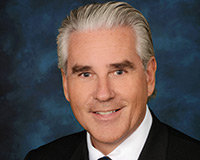 When you head up global capital markets for the biggest real estate agent in the world, you tend to get asked the same question over and over again. Luckily CBRE’s Chris Ludeman is a patient man.
When you head up global capital markets for the biggest real estate agent in the world, you tend to get asked the same question over and over again. Luckily CBRE’s Chris Ludeman is a patient man.
“Obviously the question depends on what is happening at the time,” he says from his New York office. “But right now? Right now it is ‘how far along are we in this cycle?’ I get asked that all the time.”
The good news for anyone after an answer is that he has one. More than one actually – which is also the bad news. There is no such thing as a blanket, economic global prediction. And not only does the response to the question depend on the geographical region and sector you are looking at, it could all change in an instant – particularly against the backdrop of erratic geopolitical issues and plummeting oil prices.
And so, says Ludeman, the world’s investors are hedging. A spread of capital is being distributed across safe zones and emerging opportunity markets as they try to cover themselves for all eventualities.
But how many of them are getting it right? And is the UK in a strong enough position to maintain its safe haven status?
Global economic outlook
Ludeman shrugs off concerns of another global recession. “We can’t judge the market now by the last financial crisis,” he says. “That was the equivalent of the 100-year-flood. We really don’t see those very often and we can’t make decisions about the future based on that.”
But he quickly qualifies this with a warning: “From what we can gather and from collecting owner-occupier feedback from around the world, 2018 is where we start to see economic expansion beginning to wain. This doesn’t mean that 2018 will be the start of another recessionary period. Rather a time when we will start to see less confidence.”
Ludeman stresses too that this is an overarching analysis. The intricacies of global economic cycles in real estate in specific regions require a more targeted focus.
Winning geographies
He believes that the US and the UK are well-placed to remain magnets for overseas money, especially as geopolitical issues create instability elsewhere. He also highlights Australia and Japan as major growth economies attracting more foreign investment into commercial and residential property.
But he warns that a reaction from some of the more restrictive global governments to increasing capital outflows to safe havens is a possibility. “We are seeing a huge outbound migration of capital from countries where investors are losing confidence in less stable markets and they want to get their money out,” he says. “The big question is how long can that last? How long will money coming out of Russia or, frankly, China remain unrestricted? Such an exodus through the system could well see restrictive governments taking control to stop funds leaving. I could see it happening by 2016.”
For investors looking to take more of a risk, South America is top of Ludeman’s list. The continent has performed badly compared with the rest of the world over the last few years after a delayed recession hit in 2011. Growth slowed to 0.8% in 2014 and a 1.2% fall in global investment was fuelled by a 19.5% fall in domestic activity. But what comes down must eventually go back up: “Brazil, Mexico, Chile and Peru are all quite attractive now,” he says. “They haven’t performed well recently but now we are seeing a lot more capital flowing in from investors who want to make the most of the upswing when it comes.”
As for the sectors to watch, Ludeman highlights logistics and retail as two likely to perform well – particularly in the US – and adds that the “real surprise” has been the shift of certain assets from alternative to core: “Healthcare, medical office buildings, multi-family developments and senior and student housing have all gained a much wider appeal among global capital investors,” he says.
“Basically products that are well known and established which, in the States at least, we have seen non-US investors becoming increasingly comfortable with. The move from home ownership to rental in the US and UK means that PRS is also becoming increasingly recognised as an asset class for investing.”
Emerging trends
While there is no such thing as a blanket, global prediction, there is a trend emerging that Ludeman does concede is all-encompassing and will have a huge impact on the longevity of global investment.
“My view is that the global flow of capital has become a structured change in most instances,” he says. “By that I mean it has become quite common and ingrained. And that is partially down to the sheer number of investors looking across borders with their funds.
“Take China as an example. The early movers of Chinese capital were the sovereigns. But as we have moved through the cycle we have started to see big development companies take major stakes in UK cities. Particularly in resi schemes. And now we are seeing high and ultra-high net worth individuals following suit. So you will start to see Chinese investors starting to invest in £20m-£30m properties.
“I know I mentioned concerns over governments restricting flow earlier – and that remains a possibility. And there will be instances in the future where things stall and slow. But the increased flow of capital across borders is here to stay.”
• Click here to download the Estates Gazette Global Investor Guide










